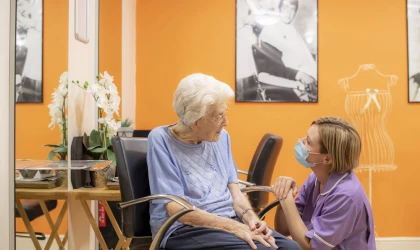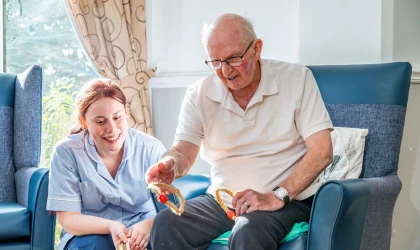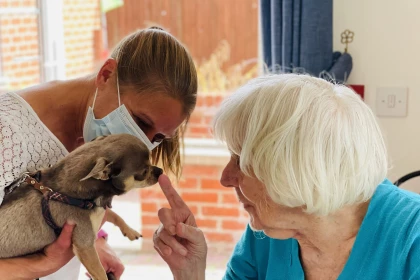
How much does residential care cost?

If you’ve reached the stage where you think that going into care might be the best option for either yourself or a relative, don’t be alarmed if you find the whole process overwhelming. It’s a stressful and emotional time for many, and the cost of care is often considered the most worrying part of the process.
At Kingsley Healthcare, we offer a complete guide to help you understand care costs and the options available. You have an opportunity to discuss this face-to-face with our home managers who are happy and willing to discuss your options – simply book an appointment at your convenience.
How much does a care home cost?
This is often the first question family members ask when discussing care requirements, but there is no clear-cut answer, as the cost is based on an individual's circumstances.
The cost of care depends on the type of support you require, your chosen care home and your finances.
Your location is also important, as the amount of financial support that local authorities offer will vary, as will the average cost of care.
When considering your future care, you’ll have to take part in a financial assessment by your local authority. This will take place in your home, or should you be in hospital, the assessment can be done there. Ask a family friend or relative to attend to provide some emotional support.
Why are some care homes more expensive than others?

If you don’t need much support around your own home at present but can see issues on the horizon, then residential care offers a long-term care solution. For example, it might be that you’re starting to struggle with looking after yourself and basic daily tasks. Or you or your loved one might be experiencing confusion with paying your bills or finding it difficult to maintain your accommodation.
Nursing care

Nursing care provides the same level of support as residential care. However, if you have complex needs or even need extra care, a nursing home with 24/7 support and care from fully qualified nursing staff could be a more appropriate option. A registered nurse will be on-site day and night to look after you, which is reflected in the cost. It’ll also give you and your relatives peace of mind.
Due to the additional services that nursing care provides, it will cost more per week than residential care.
State funding vs self-funding
Who pays for the costs of a care home?
Depending on your assets and the amount of capital you own, your care will either be funded by your local authority (state-funded) or by the person going into care (self-funded). This can be a complex area, and if you’re in any doubt or feel very stressed about this question, please get some help. We provide a list of specialist organisations.
There is also an option to be partially state-funded, with the remainder of the fees to be self-funded by a ‘top-up’. This, again, depends on the amount of money you have and the value of your assets.
If the amount of capital you own falls under a particular threshold, most care fees will be state funded.
If the amount of capital you own is above the threshold, you will be asked to fund your care.
What funding can I receive?

Your local authority will offer you a means-tested financial assessment when looking at the financial support they can offer. If you feel nervous about this, ask a trusted friend or family member to attend the assessment. The authority will want to conduct a means-tested financial assessment of your needs and finances.
Here’s the financial proof that they’ll be looking at to work out your total capital:
- Savings and income (including pension, benefits and earnings)
- Property owned (this will not be included if you still live with your partner)
- Investments
- Business Assets
- Land Owned
|
The amount of capital you own |
Funding entitlement |
|---|---|
| Less than £14,250 | Your local authority will fund the care costs. |
| Between £14,250 and £23,250 | You may be entitled to some financial help from your local authority. |
| More than £23,250 | You will be expected to self-fund the care costs. |
It’s important to remember that social care is rarely free, and the odds are that you will be paying at least some money towards the cost of your care in a residential home.
There are key points to consider during your financial assessment that may impact your eligibility for financial help from your local council:
- Your means test assumes you’re claiming all your entitled benefits. Make sure you are receiving everything you’re entitled to, and seek advice if you’re unsure.
- Some types of income are not included in the means test, such as disability benefits.
- If you and someone else jointly own capital, such as a joint savings account, it will usually be treated as equally divided between you.
(Information correct as of 04/03/2021)

What services are included in the care home fees?
Ask for a full list of fees when researching a care home. The last thing you’ll need is an unpleasant financial surprise in the future. Also, to make sure you’re getting the quality of care you deserve, ensure the care home has a compliance team in place. You want to be satisfied that your future home is of the highest possible standard.
Services included in your care will, of course, depend on the type of care you require, the location of the home you’ve chosen, and the type of room selected.
In general, the cost of a care home includes:
- Living Costs – Accommodation, catering, cleaning, laundry and utilities. Remember, as bills go up in the outside world, these will also impact your care costs.
- Costs of Care – either residential, nursing and/or dementia care.
- Wellbeing and Activities – Activities are vital for promoting a feeling of wellbeing, and they’re an excellent way to encourage you to interact with other residents, but naturally, they do come with a cost. Wellbeing Coordinators ensure a regular schedule of activities which stimulates residents mentally and physically. Activities are at the heart of person-centred care to ensure you or your relatives can transition to their new residential care lives and live as happily and independently as possible.
Additional Expenses
Extra services including hairdressing, private chiropody, and costs of newspapers and toiletries etc. will incur additional fees not covered by standard fees, in the same way that you had to pay for these when living in your own home.
Some homes have an all-inclusive status, which means the additional services mentioned above are included in the flat weekly rate. Ensure you’re clear on what costs are included and what are in addition to the care home fees.
Any deposits and/or administration fees, which the care home may also require, depend on the provider. Good care providers will always supply a complete list of care home costs, what is included and when it needs to be paid. Ask for this list from your provider then you’ll have peace of mind that you know what you’ll be paying and when.

Useful Resources copy
Here’s a list of other helpful resources that can offer more information on choosing a care home and the funding process.
Age UK is the leading charity for older people in the UK. The charity can offer advice and guidance on ageing and care.
Age UK
Age UK and Which? also offer a helpful online tool to help you determine funding based on your circumstances.
Age UK and Which?
The NHS provides guidance on social care and what to look for when choosing a care home.
NHS
Carehome.co.uk is an authoritative website with an in-depth guide to selected care homes and offers advice when looking at care.
Carehome.co.uk
Eldercare Group provides expert financial advice regarding long-term care home funding.
Eldercare Group
Turn2us is a national charity website which supports those claiming benefits. The link below discusses benefit entitlements when in a care home.
Turn2us
Which? provides independent guides and has extensive written guides when considering care for your loved one.
Which?






